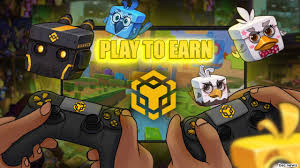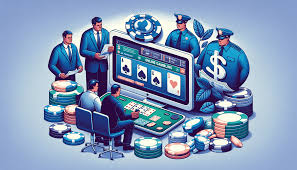
The rise of play-to-earn (P2E) games has marked a seismic shift in the gaming industry, opening up exciting new ways for players to earn real money while playing. These games leverage blockchain technology, allowing players to earn cryptocurrency, non-fungible tokens (NFTs), and other digital assets by engaging in game activities like battling, crafting, or exploring virtual worlds. As the P2E model continues to grow, it is transforming gaming from a form of entertainment into a legitimate income-generating venture. This evolution is not only reshaping how players engage with games but also influencing broader trends in online earning, opening up new opportunities for gamers to make money from the comfort of their homes.
The Integration of Blockchain and Cryptocurrency in Gaming
At the core of P2E games is blockchain technology, which enables players to truly own their in-game assets. In traditional games, in-game items and rewards are owned by the game developers, but with blockchain, these assets are recorded as NFTs, which are unique, verifiable digital items that can be bought, sold, and traded. Cryptocurrency plays a central role in these games, with players earning digital currency for in-game achievements, such as completing tasks or winning battles. This can then be exchanged for real-world currency or reinvested into the game. As blockchain adoption increases, more developers are incorporating this technology into their games, allowing players to take part in virtual economies with real-world financial implications. Over time, this integration will continue to grow, expanding the opportunities for gamers to earn money by participating in digital ecosystems.
Virtual Real Estate and Digital Ownership: A New Frontier
As blockchain-based games become more sophisticated, the concept of virtual real estate is emerging as a significant way for players to earn income. In games like Decentraland and The Sandbox, players can buy, sell, and develop virtual land, essentially creating their own digital property portfolio. These virtual worlds allow users to create businesses, host events, or build structures within their land, all of which can generate income. Virtual real estate has gained serious traction, with some plots of land selling for thousands of dollars. As the metaverse continues to evolve, virtual land could become an even more valuable asset class, offering players not just a place to play, but also a platform to build, create, and monetize digital ventures. This opens up new possibilities for players to act as both entrepreneurs and creators, blending gaming with the real-world economy in unique ways.
The Growth of Online Earnings and Remote Work Opportunities
The future of play-to-earn games extends beyond just gaming itself and is closely tied to the broader movement of remote work and online earnings. For many, P2E games are more than just a hobby—they are becoming a legitimate source of income. This trend is particularly evident in countries with limited access to traditional job markets, where players can rely on P2E games as a way to support themselves financially. In regions like Southeast Asia, for example, many individuals have turned to games like Axie Infinity as their primary source of income, playing full-time and earning cryptocurrency that can be converted into local currency. The flexibility and accessibility of P2E games make them an appealing option for anyone looking to earn money from home, further accelerating the trend of online income generation.
Challenges and Opportunities in the Play-to-Earn Ecosystem
While the future of P2E games looks promising, there are still challenges to overcome. One of the primary concerns is the volatility of cryptocurrency markets, which can cause fluctuations in the value of in-game assets, leading to unpredictable earnings. Additionally, the initial investment required for some games—such as purchasing NFT characters or assets—can be a barrier to entry for some players. As the P2E ecosystem matures, developers will need to address these challenges by creating more stable and sustainable models that provide consistent earning opportunities without the need for significant upfront costs. Another key issue is the sustainability of P2E games, as some have been criticized for relying too heavily on new players to invest money into the game. However, as blockchain technology evolves and more games adopt these models, we can expect to see more innovative solutions that balance fairness, profitability, and long-term sustainability.
A New Era of Gaming and Earning: What’s Next?
The future of play-to-earn games is filled with exciting possibilities. As the industry continues to grow, we can expect to see more mainstream game developers adopting blockchain technology, further integrating NFTs, and expanding digital economies within games. The growth of metaverse platforms and virtual worlds will likely continue to fuel new opportunities for players to earn money through creativity, entrepreneurship, and digital commerce. As more people around the world discover the potential of earning through gaming, the gaming industry itself will become a more significant part of the global economy. Moreover, the ongoing developments in virtual reality (VR) and augmented reality (AR) technologies could bring even more immersive and profitable gaming experiences. Ultimately, the play-to-earn model is paving the way for a new era where gaming is not just a form of entertainment, but a dynamic, ever-evolving source of income and opportunity.
Experience top-tier gaming at KKClub – Pakistan’s premier online casino with big wins and safe play!



